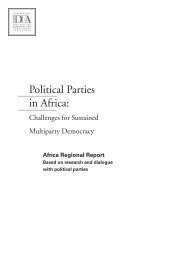Seminar Report The role of Political Parties in Democratic Transitions
Seminar Report The role of Political Parties in Democratic Transitions
Seminar Report The role of Political Parties in Democratic Transitions
You also want an ePaper? Increase the reach of your titles
YUMPU automatically turns print PDFs into web optimized ePapers that Google loves.
Introduction<br />
In this report we aim at present<strong>in</strong>g the key highlights from the multiparty sem<strong>in</strong>ar held <strong>in</strong> Yangon regard<strong>in</strong>g<br />
the <strong>role</strong> <strong>of</strong> political parties <strong>in</strong> democratic transitions. <strong>The</strong> deliberations and discussions were very rich and<br />
constructive and thus it is not possible to cover it all <strong>in</strong> a report, but the ma<strong>in</strong> sem<strong>in</strong>ar proceed<strong>in</strong>gs follow<br />
below.<br />
<strong>The</strong> sem<strong>in</strong>ar brought together a total <strong>of</strong> 116 participants <strong>in</strong>clud<strong>in</strong>g Myanmar political party representatives<br />
(from 47 registered political parties), representatives from the Union Election Commission and key local<br />
civil society groups engaged <strong>in</strong> democratisation. Experts and practitioners from Indonesia, South Africa,<br />
Nepal and representatives from <strong>in</strong>ternational democracy assistance organizations jo<strong>in</strong>ed them to share<br />
their experience on democratic processes.<br />
<strong>The</strong> aim <strong>of</strong> the sem<strong>in</strong>ar was well achieved thanks to the participation and engagement <strong>of</strong> the political<br />
parties <strong>in</strong> Myanmar and many others. “This is the first time for decades that so many parties are gathered<br />
around the same table,” one <strong>of</strong> the political party leaders claimed and cont<strong>in</strong>ued: ”Moreover, we have not<br />
before jo<strong>in</strong>tly discussed our common <strong>role</strong>s and challenges as political parties”. <strong>The</strong> aim was exactly to<br />
broaden the understand<strong>in</strong>g <strong>of</strong> democratic transition processes <strong>in</strong> general and the <strong>role</strong>s <strong>of</strong> political parties<br />
as democratic actors <strong>in</strong> Myanmar’s emerg<strong>in</strong>g democracy <strong>in</strong> particular. Moreover, the aim <strong>of</strong> the sem<strong>in</strong>ar<br />
was to share knowledge, experiences and lessons learned from political transition processes <strong>in</strong> other<br />
countries that share similarities with Myanmar – and <strong>of</strong>fer an <strong>in</strong>clusive platform for to discuss issues <strong>of</strong><br />
national importance as well as key challenges and opportunities that Myanmar political parties face dur<strong>in</strong>g<br />
this important time. Thus, the first day was conducted <strong>in</strong> plenary and the second day four workshops on<br />
the various themes were held.<br />
<strong>The</strong> sem<strong>in</strong>ar was the first activity <strong>of</strong> the Myanmar Multiparty Democracy Programme established by the<br />
Danish Institute for <strong>Parties</strong> and Democracy (DIPD) and the Netherlands Institute for Multiparty Dialogue<br />
(NIMD). <strong>The</strong> sem<strong>in</strong>ar was co-hosted by Nye<strong>in</strong> (Shalom) Foundation.<br />
<strong>Sem<strong>in</strong>ar</strong> theme: <strong>The</strong> <strong>role</strong> <strong>of</strong> <strong>Political</strong> <strong>Parties</strong> <strong>in</strong> <strong>Democratic</strong> <strong>Transitions</strong><br />
<strong>The</strong> sem<strong>in</strong>ar confirmed that the political parties <strong>in</strong> Myanmar are right now tak<strong>in</strong>g important new steps and<br />
also fac<strong>in</strong>g a lot <strong>of</strong> challenges and opportunities. While the situation is unique there are useful lessons and<br />
experiences to draw from globally.<br />
<strong>Political</strong> parties play a particularly important <strong>role</strong> dur<strong>in</strong>g political transition processes. Dur<strong>in</strong>g these<br />
periods, political parties have to make the system work and beg<strong>in</strong> to deliver on some <strong>of</strong> the expectations<br />
that the public has <strong>in</strong>vested <strong>in</strong> them. Dur<strong>in</strong>g transitional periods political parties have a very important <strong>role</strong><br />
to play <strong>in</strong> support<strong>in</strong>g and contribut<strong>in</strong>g to the new emerg<strong>in</strong>g political system. In the process <strong>of</strong> adapt<strong>in</strong>g to<br />
their new <strong>role</strong>s <strong>of</strong> oversight, aggregation and representation <strong>of</strong> citizens’ <strong>in</strong>terests and act as an <strong>in</strong>terlocutor<br />
between citizens and the state, they face many challenges, <strong>in</strong>clud<strong>in</strong>g deliver<strong>in</strong>g on some <strong>of</strong> the<br />
expectations that the public has <strong>in</strong>vested <strong>in</strong> them. This is the case <strong>in</strong> Myanmar and many other countries<br />
that have undergone a transitional process.<br />
<strong>The</strong> background document to the sem<strong>in</strong>ar was the DIPD Reader “<strong>Political</strong> <strong>Parties</strong> <strong>in</strong> <strong>Democratic</strong><br />
<strong>Transitions</strong>” (now available <strong>in</strong> English and Myanmar language, http://dipd.dk/dipdpublications/), which<br />
shows <strong>in</strong>terest<strong>in</strong>g f<strong>in</strong>d<strong>in</strong>gs from the transitions <strong>in</strong> Indonesia, Turkey, Serbia and South Africa that might be<br />
relevant for the political parties <strong>in</strong> Myanmar. <strong>The</strong> publication shows that despite every country and every<br />
transition has its own dist<strong>in</strong>ctiveness, four themes emerge that reflect common, <strong>of</strong>ten very practical<br />
challenges for parties:<br />
Strengthen<strong>in</strong>g the political party organisation;<br />
Establish<strong>in</strong>g multiparty dialogue between political parties;<br />
Negotiat<strong>in</strong>g space for democratic politics;<br />
Respond<strong>in</strong>g to voter expectations: Representation and delivery;<br />
2
















